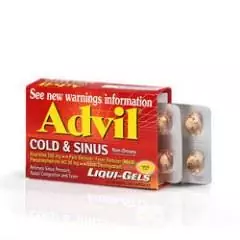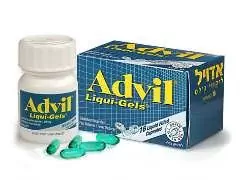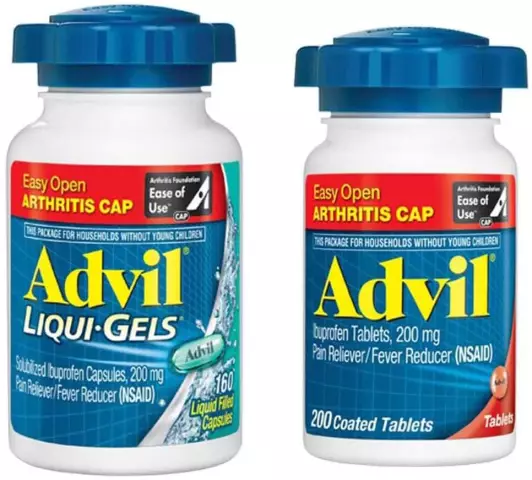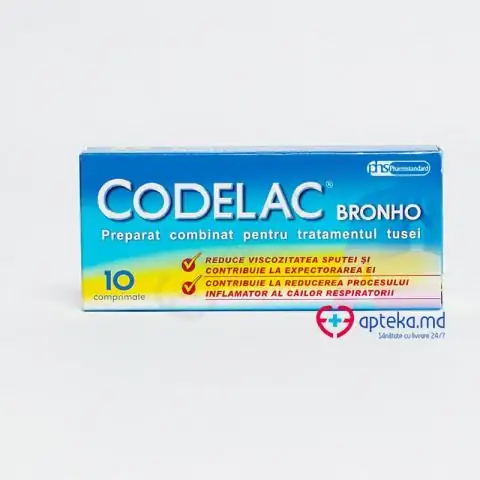- Author Rachel Wainwright [email protected].
- Public 2023-12-15 07:39.
- Last modified 2025-11-02 20:14.
Advil
Instructions for use:
- 1. Pharmacological action of the drug
- 2. Indications for use
- 3. Instructions for use of the drug
- 4. Contraindications to use
- 5. Side effects
- 6. Interaction with other drugs
- 7. Special instructions
- 8. Storage conditions
Advil is a drug that is used to reduce painful sensations during inflammation. Medical reviews about Advil say that this drug is very popular among consumers, as it provides effective and quick relief from pain. Advil is available in the form of film-coated tablets, in the form of drops and in the form of rectal suppositories. Ibuprofen is the main active ingredient of the drug.
Pharmacological action of the drug Advil

The drug Advil has antipyretic, anti-inflammatory and analgesic effects. The analgesic effect of the drug is most pronounced for painful sensations associated with inflammatory processes.
Indications for use
According to the instructions, Advil can be used for headache or toothache, for muscle pain, back pain. The drug can be used for inflammatory and degenerative diseases of the spine and joints (including rheumatic and rheumatoid arthritis, ankylosing spondylitis, osteoarthritis). This remedy is prescribed to relieve pain in myalgia, neuralgia, adnexitis, algodismenorrhea. Advil tablets can be used in the treatment of articular syndrome with exacerbation of gout, as well as with psoriatic arthritis, tendonitis, radiculitis, and traumatic inflammation of the musculoskeletal system and soft tissues.
Instructions for use of the drug
The instructions for Advil say that the doses of the drug are set individually. The dose of Advil depends on the nosological form of the disease and the severity of clinical symptoms. When Advil tablets are taken rectally or orally, a single dose for adults ranges from 200 to 800 mg. The drug is recommended to be taken three to four times a day.
With ankylosing spondylitis, psoriatic arthritis, with osteoarthritis - 400-600 mg three to four times a day. With algodismenorrhea - 400 mg three to four times a day.
For children over 12 years of age, Advil tablets are prescribed in an initial dose of 150-300 mg three times a day, and then 100 mg three times a day.
Oral suspension can be given to children aged 3 to 12 months only as directed by a doctor (50 mg of the drug three to four times a day). Children from one to three years old are prescribed 100 mg of the drug three times a day. Children from four to six years old are prescribed 150 mg of Advil three times a day. Children from seven to nine years old are recommended to take 200 mg of the drug three times a day, children from ten to twelve years old - 300 mg of the drug three times a day.
In case of febrile syndrome, after immunization, the child should be given 50 mg of Advil. If necessary, repeat the intake in the same dose after six hours. The maximum daily dose should not exceed 100 mg.
At high temperatures, children aged three to nine months can be administered one suppository three times a day every eight hours (no more than 180 mg per day). Children between the ages of nine months and two years may be given one suppository four times a day every six hours.
In case of post-vaccination fever, children from three months to one year old need to enter one Advil suppository, children over one year old are allowed to enter another suppository after six hours. The duration of the use of the drug for pain syndrome is no more than five days, with fever - no more than three days.
Contraindications for use
The instructions to Advil say that this drug should not be used in case of ulcerative and erosive lesions of the digestive tract in the acute phase, in diseases of the optic nerve, in the "aspirin triad", as well as in violation of hematopoiesis, severe impaired liver and / or kidney function, hypersensitivity to ibuprofen.
Side effect

The reviews about Advil say that with prolonged use of this drug in treatment, dizziness, headache, visual impairment, sleep or renal function may appear.
Some reviews about Advil say that patients with autoimmune diseases with prolonged use of the drug can develop aseptic meningitis.
With external application of Advil, tingling or burning sensations, skin redness are possible. In some patients, when using Advil in treatment, a feeling of discomfort in the epigastric region, diarrhea, vomiting, and nausea appears.
Interaction with other drugs
According to the instructions, Advil enhances the effect of antihypertensive drugs (beta-blockers, ACE inhibitors), diuretics (hypothiazide, furosemide). Advil enhances the effect of anticoagulants. Simultaneous use with warfarin can lead to the development of microhematuria, hematoma. Combined use with lithium carbonate leads to an increase in the concentration of lithium in the blood plasma. The initial absorption of ibuprofen is increased with the simultaneous use of Advil with magnesium hydroxide.
special instructions
Advil should be used with caution in case of concomitant diseases of the kidneys and liver, chronic heart failure, with dyspeptic symptoms before starting therapy, after operations. Do not use the drug externally on damaged skin areas.
Storage conditions
Advil should be stored at temperatures below 25 ° C, protected from the sun's rays. The shelf life is 36 months.
Information about the drug is generalized, provided for informational purposes only and does not replace the official instructions. Self-medication is hazardous to health!






